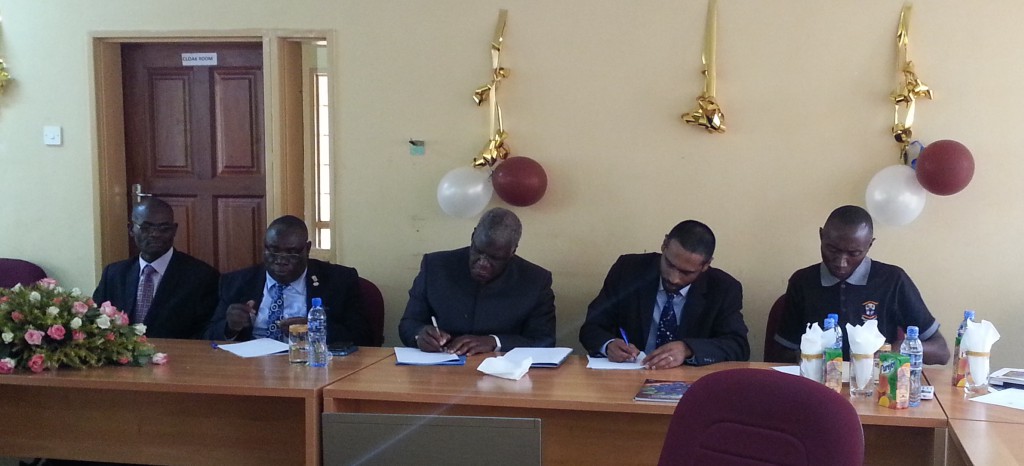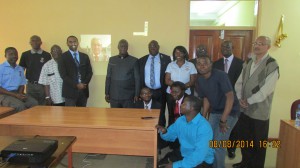Website: Southern African Regional Office
Media Release:
8 August 2014, Kitwe, Zambia: Today the International Astronomical Union (IAU) signed an important agreement with the Copperbelt University (CBU) to host a Southern African regional node of the IAU Office of Astronomy for Development (OAD). This is the second regional node to be established on the African continent and forms part of the IAU’s decadal strategic plan, which aims to realise the global societal benefits of astronomy. The signing follows the approval of a proposal from CBU which enjoyed the support of astronomy collaborators in Mozambique, Namibia, Zambia and South Africa, including the South African Square Kilometre Array Project Office.

The IAU strategic plan was ratified by its members in 2009, at its General Assembly. Since then a global coordinating office (the OAD) was established in Cape Town, South Africa, and has led the implementation of this plan. Other regional nodes have already been established in China for the East Asian region, Thailand for the South East Asian region and Ethiopia for the East African region. The establishment of this Southern African regional node is significant as this part of the continent is currently very active in terms of the development of world class astronomy facilities including the optical Southern African Large Telescope (SALT), the radio Karoo Array Telescope (MeerKAT) and the gamma-ray High Energy Stereoscopic System (HESS). The office in Zambia will need to rally all these advantages to benefit the region at large.
Director of the OAD Kevin Govender comments on the signing of this agreement: “Zambia is ideally positioned to play a leadership role in this field. Not only is it a part of the Square Kilometre Array project, but its consistent commitment to developing astronomy capacity nationally serves as an example to other countries in the region. Since the International Year of Astronomy in 2009 we have seen Zambia regularly represented in various global astronomy education and outreach projects. Their experience and dedication to the field of astronomy will be a great benefit to the region.”

This office will also reach out to other countries in Africa which, like Zambia, form part of the Square Kilometre Array (SKA) project. This is a key task to ensure that all countries involved in the SKA have the skills and personnel required both to derive maximum benefit from the iconic telescope project and to help make the SKA a scientific success.
Dean of the School of Mathematics and Natural Sciences at Copperbelt University, Professor F.P. Tailoka: “The Copperbelt University and the country at large are delighted to host the Southern African Regional Office of Astronomy for Development. We are grateful to the International Astronomical Union (IAU) and other cooperating partners for facilitating the signing of this important agreement. As the motto of our university states ‘Knowledge and Service’ – it is our belief that Zambia will continue developing as long as scientific principles form part of the services offered. We are so pleased to be part of the implementation of the IAU’s strategic plan. Zambia is a partner country of the Square Kilometer Array (SKA) project. This gives us an opportunity to participate in world class astronomy research. We look forward to seeing the Zambian community, and the rest of the region, realizing the benefits of astronomy.”
Signing the agreement on behalf of the IAU, Assistant General Secretary Piero Benvenuti said:
“Astronomy is possibly the most ancient scientific activity of the mankind and IAU is committed to maintain and spread worldwide this precious heritage. Astronomy however is not only pure science, it is a fascinating cultural adventure that engages the entire society and brings many benefits. It is a powerful attraction to young generations to follow mathematical and scientific curricula and, with its most recent projects, like the Square Kilometre Array, it fosters advanced technological developments. It is therefore with great satisfaction that IAU praises the Zambian Government and the Copperbelt University for their farsighted support to the establishment of the Southern African Regional Office of Astronomy for Development.”
The Copperbelt University was established as a Public University by Act of Parliament No. 19 on 1st December 1987. It is Zambia’s second largest public university, located in Kitwe in the Copperbelt Province. The Copperbelt University has seven schools (faculties) offering programs in natural sciences, engineering, mining, medicine and business studies. The current number of student enrollment stands around 13, 000. The School of Mathematics and Natural Sciences was established in June 2008 with a vision to become a recognised centre of excellence committed to the advancement of mathematical and scientific knowledge, innovations, and the exemplary teaching/learning of mathematics and sciences.
This agreement follows the IAU’s Announcement of Opportunity which remains open to letters of intent and proposals from all around the world to host similar nodes. The partners of this regional node will establish a steering committee which consists of relevant expertise and representation.
